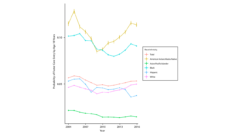The COVID-19 pandemic lockdowns disrupted almost everyone’s life, and we struggled to adjust. Children, in particular, experienced many jarring changes at the start of the pandemic.
With the recent release of the 2020 National Survey of Children’s Health (NSCH), Researcher Lydie Lebrun-Harris and her colleagues examined health trends of children aged 0 to 17 from 2016 to 2020, just before the first COVID-19 vaccines were released. The researchers analyzed changes over time in children’s mental and physical health conditions, their access to health care, and their caregivers’ mental and emotional well-being.
As seen in the figure above, there was a 27% increase in anxiety diagnoses and a 24% increase in depression. This represents more than 5.6 million and 2.4 million kids nationally diagnosed with anxiety and depression, respectively. The researchers also observed an increase in reported behavior or conduct problems described by either a doctor, other health care providers, or educators from 2019 to 2020, representing another 5 million children. At the same time, the early days of the pandemic saw increased unmet health care needs among children, along with decreasing preventive medical care visits.
Lebrun-Harris and colleagues note an increased number of parents with young children who either quit, declined, or changed jobs because of problems with childcare during the pandemic. In addition, caregivers struggled with declines in mental and emotional well-being and decreased ability to cope with parenting demands.
These findings highlight several areas of concern, indicating an urgent need to ensure children’s access to timely health care services and promote healthy behaviors for parents and children, alike. The authors recommend investments in several programs administered by the Maternal and Child Health Bureau of the Health Resources and Services Administration. These programs set out to address the several shortfalls in children’s health identified in this study, including expanding access to pediatric mental healthcare, accelerating well-child visits and immunizations, addressing parental stress and promoting family well-being.
Databyte via Lydie A. Lebrun-Harris, Reem M. Ghandour, Michael D. Kogan, et al. Five-Year Trends in US Children’s Health and Well-being, 2016-2020. JAMA Pediatrics, 2022.














